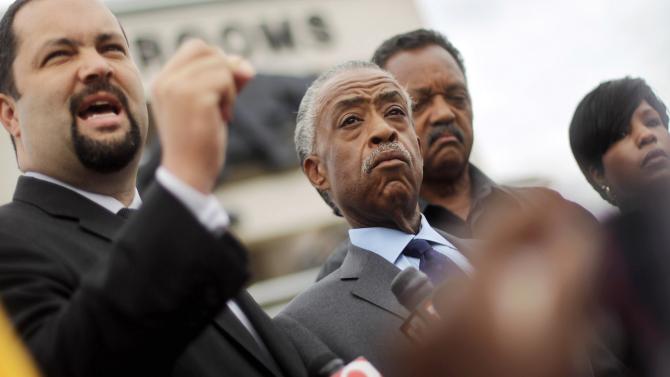Every so often, an incident symptomatic of deeper issues triggers a release valve for collective despair. The killing of Michael Brown in Ferguson, Mo., sparked a movement much larger than concerns about the aggressive policing of black men. The marches and protests are a larger commentary about the economic and societal disenfranchisement of black people and the response to Brown’s death is a coalescing event, sounding the latest clarion call for America to revisit her unresolved original sin.
But movements need leaders. And while this one certainly has organizers doing important work, it is missing the critical element that black America has not produced for some time: a national, unifying figure. Black America needs its own presidential figurehead—a chief executive who can artfully make the compelling case to the country that we are unfairly and unconstitutionally subjugated. A case that needs to have a face and voice with which the nation can interact, associate and, in theory, negotiate.
Though familiar faces take the mantle in times of uncertainty or calamity, none are the embodiment of the larger, enduring and unrelenting cause. In a survey last year, a plurality of black Americans (40 percent) said there is no leader who speaks (pdf) for them. Even when familiar names were presented, such as the Rev. Jesse Jackson or current Congressional Black Caucus members, only 1 in 10 felt these leaders were adequately giving voice to their issues. The most popular name was the Rev. Al Sharpton, but there is a growing sentiment that his vision and approach lack currency. And the individual who might be the most capable, President Barack Obama, has explicitly stated that he’s “not the president of black America,” he’s president of the United States.
The call for a president of black America may, at first blush, sound odd. And some rightly point out that, technically, no such entity exists. But black America is about 45 million people strong and has buying power of just over a trillion dollars. This means black America has an economy roughly equivalent to Portugal’s and a population that is about the same as Spain’s. That should translate to a significant amount of economic and political power. But without a leader to marshal this capital, we’re treated like a subcultural afterthought that only commands national attention when it appears in need of a good squelching.
o complicate matters, Americans tune in to the spectacle of racial confrontation—militarized police tossing tear gas and rubber bullets at black citizens—but walk away from the visual starkly polarized. Recent polling shows that the nation is divided on its perception of the policing of blacks, questions on reparations and apologies (pdf) for slavery and segregation, and even about the root cause of the Civil War. Further, disparities in housing, health outcomes, education, income, household wealth and unemployment basically remain at the same levels they did when Martin Luther King Jr. ascended the Lincoln Memorial to tell the nation about his dream.
In that context, the president of black America would be the woman or man who carries black America’s policy concerns to state campaigns and through election cycles. She speaks softly and carries a big stick. The soft speech would be the lobbying of corporations to address unemployment and fair pay. And when he engages the federal government, it would be to remedy the failings in the nation’s track record when it comes to governing black Americans.
And the big stick would be the marshaling of the black electorate and black purchasing power. The evidence is in: No one votes more than black people. Blacks have recently turned major senatorial and gubernatorial elections in both parties. And the black American economy sustains numerous businesses and products across the nation; no dollar leaves a community faster than the black dollar. This is unfortunate, but it is also leverage.
Of course, the president of black America is just a symbolic label, not an elected position. But it needn’t be. After all, who elected Frederick Douglass, Booker T. Washington and King to be the personification of black America in their respective eras?
The black experience in America is a series of incremental gains in the face of perpetual existential crises. Ferguson taught America nothing it didn’t already know; it’s simply a reminder that there are no shortcuts past the hard work of reconciliation that must be done. As such, a leader is needed, once again, to bring about the change that will slowly inch black America closer to the security and opportunity that not all of its citizens have enjoyed.
Ear Hustle 411 would like your opinions on this wonderfully written article and let us know how you feel.
Source: TheRoot.com
Writer: Theodore R. Johnson III
[AdSense-A]







![White Christian Man Says The White Establishment Is Afraid Of A Free Educated Black Man With A Rifel [ VIDEO]](https://earhustle411.com/wp-content/uploads/2016/08/white-america2-300x180.jpg)
![White Christian Man Says The White Establishment Is Afraid Of A Free Educated Black Man With A Rifel [ VIDEO]](https://earhustle411.com/wp-content/uploads/2016/08/white-america2-80x80.jpg)








































































































































































































































![[Video] Chicago Police Officers Caught On Video Telling Two Black Men "We Kill Mother F**kers"](https://earhustle411.com/wp-content/uploads/2018/07/evil-cop-3-300x180.jpg)
![[Video] Chicago Police Officers Caught On Video Telling Two Black Men "We Kill Mother F**kers"](https://earhustle411.com/wp-content/uploads/2018/07/evil-cop-3-80x80.jpg)












![[Video] White Woman Calls The Cops On Black Real Estate Investor, Cops Threaten To Arrest Her For Harassing Him](https://earhustle411.com/wp-content/uploads/2018/05/nosy-neighbor-300x180.png)
![[Video] White Woman Calls The Cops On Black Real Estate Investor, Cops Threaten To Arrest Her For Harassing Him](https://earhustle411.com/wp-content/uploads/2018/05/nosy-neighbor-80x80.png)


![White Scientist Says The Black Community Is Being Targeted By The Medical System, They Are Deliberatly Being Poisoned [Video]](https://earhustle411.com/wp-content/uploads/2016/05/mike-adams-300x180.jpg)
![White Scientist Says The Black Community Is Being Targeted By The Medical System, They Are Deliberatly Being Poisoned [Video]](https://earhustle411.com/wp-content/uploads/2016/05/mike-adams-80x80.jpg)








![Teenage Girl Shot In Her Stomach Three Times But Took Time To Post To Facebook [ Video]](https://earhustle411.com/wp-content/uploads/2016/02/Gangster-chick-300x180.jpg)
![Teenage Girl Shot In Her Stomach Three Times But Took Time To Post To Facebook [ Video]](https://earhustle411.com/wp-content/uploads/2016/02/Gangster-chick-80x80.jpg)







